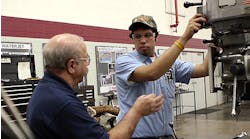Readers who devote their days to producing cast metal parts surely know all the arguments about reducing time and cost, cutting overhead, and operating lean — and yet their business remains centered on actual parts. That’s a certainty. They may not fully appreciate the pressure and influence exerted on people in other businesses to reduce the evidence that there has been any work done at all: paperless, immediate, “deliverable.”
• Also read Lost to the Ages on the unifying value of work.
My own workspace is a screen with multiple panes sliding in and out of view, each one alerting me to some project that demands my full and immediate attention, requiring some unfathomable connection between my mind and fingers and another entity invisible to me — except through those ephemeral signals. At the end of the day, I fold the screen and there is no indication that I’ve done anything.
With deference to the importance of those castings, it’s nevertheless true that this is the nature of much of the work that gets done in the world every day. And that, I believe, explains the confusion and anxiety that has been generated by “Bitcoin” over the past year or so, even before the current buzz suggesting a fraudulent enterprise or criminal network.
It may be proven to be a shady deal, but most people will never deal in Web-based currency: the hysteria is based in the idea that Bitcoin suggests that our lives and the things we hold valuable have no weight, no consequence, and leave no trace in the eternity of time and space that we try to impact by our lives and work.
Bitcoin is currency bought and sold on a peer-to-peer network, with no central bank monitoring or insuring transactions. One assumption is that this money is used for black market (or worse) payments, but supporters see it as freedom from the regulations, costs, and of course insurance against loss. Now, there have been some catastrophic losses in the Bitcoin market, so the risk that has always pertained to this enterprise is made more clear.
And that reconfirms skeptics in their view that the whole project is corrupt. But in fact this difference in views is the real story of Bitcoin: it seems that everyone wants the personal security of knowing that their lives and work have value, and most are willing to extend themselves, work harder, take some risks, to enhance that value. In the undefined spaces where we now live and work, the security grows more elusive, and the risk grows greater that we may disappear without any trace — and that realization is a cause for anxiety.










